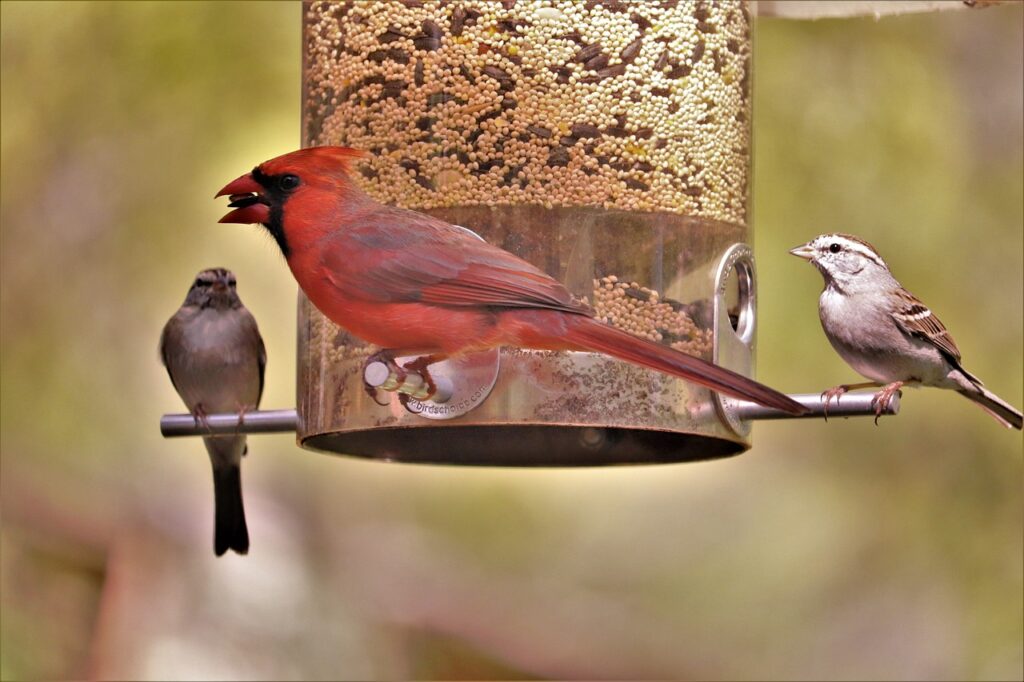Today’s blog

Lynn Murphy Mark
Birdsong
I look out the window by my desk and see the trees that are lined up behind our place. There are no leaves, so I can see the occupants. Little birds nervously flying form one branch to another. Acrobatic squirrels who run gracefully up and down the vertical parts of the tree. The trees are also home to a pair of Cardinals who never stray too far from their favorite limbs.
Along with the animal sightings comes the sweet symphony of birds singing. I can hear them through the thick glass and I am grateful that this sound of nature is available to me. It’s especially pronounced in Spring and Summer, but birds must have a reason to perform in the Winter, too, because they carry on even in the coldest weather.
In return for this gift I put out birdseed. The kind I’m using now has little bits of nuts in it, so the squirrels also benefit. But I learned from a friend that if I really want to please the neighborhood winged wildlife I will switch to safflower seeds. Apparently these seeds are rich in protein and fat, things that birds need especially at this time of year. Another plus is that these seeds are not popular with squirrels, so it’s possible that only birds will feast on the new fare.
I have nothing against squirrels. Well, at one point when I lived in Webster Groves, a squirrel family took up residence in the attic of my house. They got in by displacing the wire mesh that covered an opening. Squirrels aren’t that big or heavy but they are active and very noisy, especially at night. My bed was directly under the place where they set up housekeeping so I was subject to squirrel antics and what appeared to be passionate love making right over my head. If I’d had a shotgun I would have shot through the ceiling. Instead, I paid a man hundreds of dollars to get rid of the varmints.
But this is a blog about birds. Our little plot of land that I look out on has become a problem area. For various reasons, the grass will not grow well and the 10’ by 12’ patch of organic material is now a muddy bog. What this means to the birds is that I can’t get to the birdfeeder without a making a muddy mess. Instead I throw out seed on the ground. What I have learned is that not all birds are ground feeders, so a certain part of the population is missing out on the feast. (Back to squirrels – they obviously love having seed on the ground so they are well fed despite my disdain.)
The birds that prefer eating from a feeder include finches, chickadees and nuthatches. I think it’s because they are smaller birds and may feel more vulnerable to predators if they are on ground level. I can’t identify all of the birds that feed off my mud patch but I think some are finches. They must be the brave ones in the family because they spend plenty of time pecking at the ground.
Anyway, tomorrow a landscape professional is coming to offer solutions to the unsightly mess in our “back yard”. I have high hopes that he will come up with a plan to beautify this little patch of ours. Whatever he suggests, it will have to include a way to mount a bird feeder. I owe our winged companions that much.
I read a disturbing report from the Audubon Society titled, “More Than Half of U.S. Birds Are in Decline”. Here’s a brief quotation: “The 2022 State of the Birds report shows plummeting bird populations across almost all habitats while highlighting the need for further conservation efforts.” The report puts the blame squarely on humanity for our part in climate change, deforestation, and pollution of waterways. This is not a new concern. Back in 1962, Rachel Carson wrote the book, “Silent Spring”, about the impact of pesticides on the natural world.
It’s a book that is still relevant, some 60 years later.
As I sit here contemplating the bird goings-on, my prayer is that an unnatural silence of no birdsong will never happen. In the meantime, I will keep feeding our feathered neighbors.

1 thought on “01/29/2023”
Thanks, Lynn, for caring for the birds! I too, love to watch them and listen to their songs.
Comments are closed.